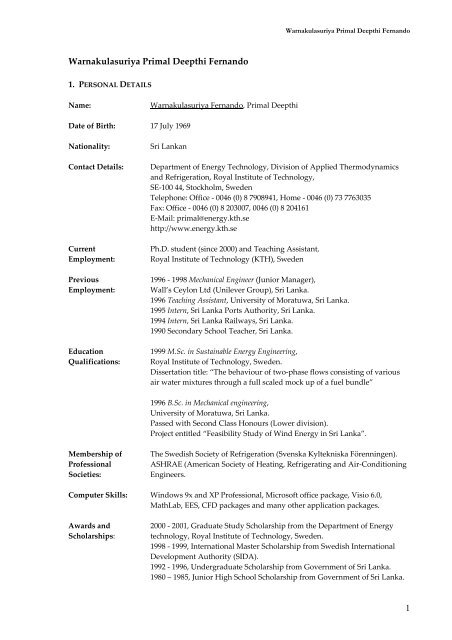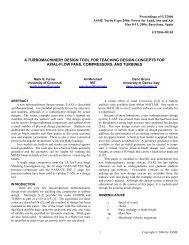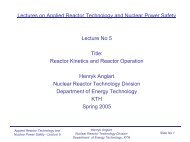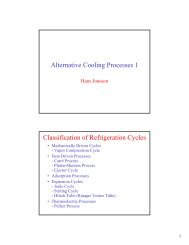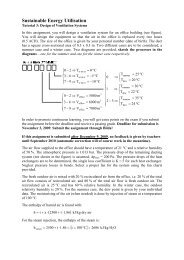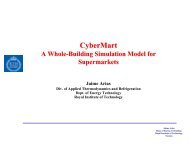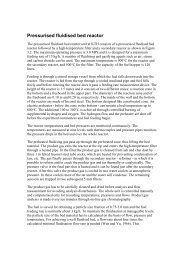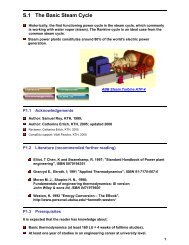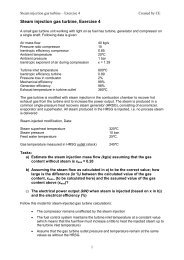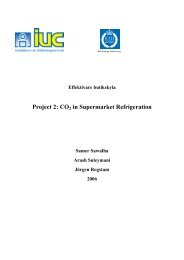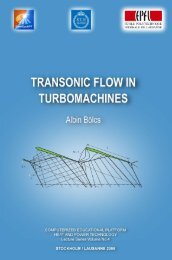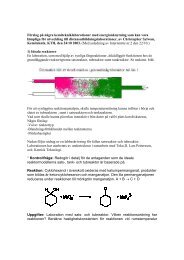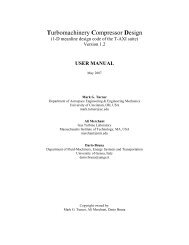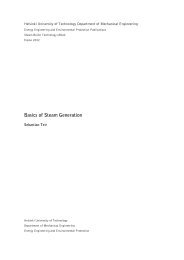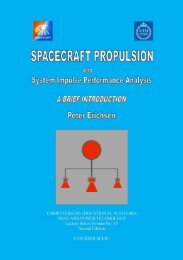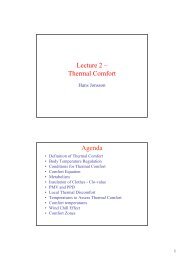Warnakulasuriya Primal Deepthi Fernando 1
Warnakulasuriya Primal Deepthi Fernando 1
Warnakulasuriya Primal Deepthi Fernando 1
Create successful ePaper yourself
Turn your PDF publications into a flip-book with our unique Google optimized e-Paper software.
<strong>Warnakulasuriya</strong> <strong>Primal</strong> <strong>Deepthi</strong> <strong>Fernando</strong><br />
<strong>Warnakulasuriya</strong> <strong>Primal</strong> <strong>Deepthi</strong> <strong>Fernando</strong><br />
1. PERSONAL DETAILS<br />
Name:<br />
<strong>Warnakulasuriya</strong> <strong>Fernando</strong>, <strong>Primal</strong> <strong>Deepthi</strong><br />
Date of Birth: 17 July 1969<br />
Nationality:<br />
Contact Details:<br />
Current<br />
Employment:<br />
Previous<br />
Employment:<br />
Education<br />
Qualifications:<br />
Sri Lankan<br />
Department of Energy Technology, Division of Applied Thermodynamics<br />
and Refrigeration, Royal Institute of Technology,<br />
SE-100 44, Stockholm, Sweden<br />
Telephone: Office - 0046 (0) 8 7908941, Home - 0046 (0) 73 7763035<br />
Fax: Office - 0046 (0) 8 203007, 0046 (0) 8 204161<br />
E-Mail: primal@energy.kth.se<br />
http://www.energy.kth.se<br />
Ph.D. student (since 2000) and Teaching Assistant,<br />
Royal Institute of Technology (KTH), Sweden<br />
1996 - 1998 Mechanical Engineer (Junior Manager),<br />
Wall’s Ceylon Ltd (Unilever Group), Sri Lanka.<br />
1996 Teaching Assistant, University of Moratuwa, Sri Lanka.<br />
1995 Intern, Sri Lanka Ports Authority, Sri Lanka.<br />
1994 Intern, Sri Lanka Railways, Sri Lanka.<br />
1990 Secondary School Teacher, Sri Lanka.<br />
1999 M.Sc. in Sustainable Energy Engineering,<br />
Royal Institute of Technology, Sweden.<br />
Dissertation title: “The behaviour of two-phase flows consisting of various<br />
air water mixtures through a full scaled mock up of a fuel bundle”<br />
1996 B.Sc. in Mechanical engineering,<br />
University of Moratuwa, Sri Lanka.<br />
Passed with Second Class Honours (Lower division).<br />
Project entitled “Feasibility Study of Wind Energy in Sri Lanka”.<br />
Membership of<br />
Professional<br />
Societies:<br />
The Swedish Society of Refrigeration (Svenska Kyltekniska Förenningen).<br />
ASHRAE (American Society of Heating, Refrigerating and Air-Conditioning<br />
Engineers.<br />
Computer Skills: Windows 9x and XP Professional, Microsoft office package, Visio 6.0,<br />
MathLab, EES, CFD packages and many other application packages.<br />
Awards and<br />
Scholarships:<br />
2000 - 2001, Graduate Study Scholarship from the Department of Energy<br />
technology, Royal Institute of Technology, Sweden.<br />
1998 - 1999, International Master Scholarship from Swedish International<br />
Development Authority (SIDA).<br />
1992 - 1996, Undergraduate Scholarship from Government of Sri Lanka.<br />
1980 – 1985, Junior High School Scholarship from Government of Sri Lanka.<br />
1
<strong>Warnakulasuriya</strong> <strong>Primal</strong> <strong>Deepthi</strong> <strong>Fernando</strong><br />
Sports and Awards:<br />
Leisure Interests:<br />
2004 - 2005 Member of Spånga Cricket Club, Sweden.<br />
2004 - 2005, Member of Energy Football team, Department Energy<br />
Technology, Sweden<br />
1993 - 1996, Member of University of Moratuwa Football team, Inter University<br />
Champion, University Colors, Vice-Captain of the team.<br />
1993 - 1996, Member of University of Moratuwa Elle team, Inter University runnerup,<br />
University Colors.<br />
1985, Member of School Volley Ball Team, School Colors, Under 17 Age Category,<br />
National Champion.<br />
1985, Member of School Cricket Team.<br />
1980 - 1990, Member of Village Softball Cricket Club, District Champion.<br />
Singing, Traveling, Playing or watching any Kind of Sport, Talking with<br />
People and Spend time with Family and Friends<br />
2. RESEARCH<br />
I am a dedicated research scientist with a strong background in Mechanical Engineering. My<br />
expertise in this area is the product of experience gained in a variety of industrial and academic<br />
settings. My long-term goals are to develop new correlations for heat transfer in microchannel heat<br />
exchangers and modelling the heat transfer and flow behaviours in microchannel heat exchangers.<br />
My research interests are,<br />
• The study of behaviours in surface tension forces and capillary actions in microchannels<br />
• The study of boiling and condensation heat transfer of various fluids in micro channels<br />
• The study of single and multiphase flows in microchannels<br />
• The study of applications in heat pump technology for various countries<br />
I have treated above problems theoretically and experimentally.<br />
Research Experience<br />
Charge minimisation of a small capacity heat pump<br />
The environmental impacts, such as ozone depleting potential (ODP) and greenhouse warming<br />
potentials (GWP) of some commonly use refrigerants have initiated the search for new kinds of<br />
refrigerants that are environmentally friendly. Propane is an environmentally friendly refrigerant<br />
and one of the best candidates to replace conventional refrigerants in existing refrigeration systems<br />
without significant technical changes in the systems. Propane does not react with engineering<br />
materials such as aluminium, brass, bronze, copper, stainless steel, silver etc. Therefore it is fully<br />
compatible with existing components such as heat exchangers, expansion valves, compressors,<br />
lubricants and copper tubing that are currently used in refrigeration systems. It is a refrigerant that<br />
has been proposed to replace refrigerant R22 which is widely used in refrigeration and airconditioning<br />
applications as both have close type of vapour pressure curves.<br />
However, flammability of propane is a major risk associated with using it as a refrigerant. The fire<br />
danger can be reduced by minimisation of the refrigerant quantity in a system. If the refrigerant<br />
quantity of a system could be kept under 150 grams, according to safety regulations, the systems that<br />
are installed and used even inside private homes will not require special safety devices assuming that<br />
the system is “hermetic”. Moreover, the lower molecular weight of propane compared to R22 would<br />
reduce the mass used per system.<br />
The ongoing project aims to develop a heat pump that uses 150g or less propane having the heating<br />
capacity of 5kW or more based on the existing knowledge of propane based heat pumps. The longterm<br />
aim is to reach the best possible heating factor. The extent of heating capacity was chosen by<br />
2
<strong>Warnakulasuriya</strong> <strong>Primal</strong> <strong>Deepthi</strong> <strong>Fernando</strong><br />
taking into consideration of the Swedish and eventually cumulative European markets for singlefamily<br />
house heat pumps.<br />
Developments<br />
First stage of the project, a heat pump was made using two commercially available brazed plate heat<br />
exchangers. Variations of the heating capacity and coefficient of performance (COP) for various<br />
refrigerant (propane) charges were investigated. For all the investigated cases the operational<br />
conditions were kept constant (evaporation approximately at -8°C and condensing at +40°C). The<br />
amounts of propane in various parts of the heat pump (evaporator, condenser, liquid line and gas<br />
line including compressor) were measured while it was in operation. The optimum quantity of<br />
propane required to obtain best heating factor (COP) was found to be 300g. Around 70 - 80 g of<br />
propane was found in the evaporator, around 100 - 130 g of propane was found in the condenser and<br />
around 70 - 80 g of propane was found in the compressor.<br />
In the second stage of the project, the brazed plate heat exchangers were replaced by commercially<br />
available minichannel heat exchangers. Experiments showed that a reduction of the optimum<br />
refrigerant charge by 75 g. However, the performance of the heat pump was lower than that of the<br />
first stage.<br />
Based on the understanding gained from the first two stages of the project, I designed three multiport<br />
minichannel aluminium heat exchangers. The heat exchangers were manufactured in a Swedish<br />
factory under my supervision. Two of the designed heat exchangers then coupled to the heat pump<br />
as the condenser and the evaporator, replacing previous heat exchangers by them. Experiments<br />
showed that the novel design reduced the optimum refrigerant charge by 100 g. The overall heat<br />
transfer coefficients were increased by more than 50% compared to the brazed plate heat exchangers<br />
used in the first stage of the project. In addition, the heating factor (COP) of the novel heat pump was<br />
slightly improved compared to the heat pump tested in the first stage of the project.<br />
The heat transfer coefficients of the minichannel heat exchanger as the evaporator and the condenser<br />
were investigated. The novel heat exchanger was tested for single-phase water-to-water heat transfer.<br />
All experimentally evaluated heat transfer coefficients were compared with existing correlations<br />
available in literature. New correlations as well as existing correlations from the literature that is<br />
suited to explain the heat transfer rates were suggested.<br />
3. TEACHING<br />
Teaching and Demonstration<br />
1. Measuring Performance of a Compressor Refrigeration Rig (Demonstrator) (2000-2004)<br />
This is taught to International and Swedish master students in the M.Sc. course on Sustainable<br />
Energy Engineering. The duration of the session is 4 hours. Measurements were made at different<br />
evaporation temperatures on a running compressor. Refrigerating capacities, coefficients of<br />
performances and various efficiencies of the compressor were calculated and discussed.<br />
2. Determining Heat Transfer Coefficients for a Finned-Tube Heat Exchanger with Forced<br />
Convection (Demonstrator) (2000-2004)<br />
This is demonstrated to International and Swedish students in the M.Sc. course on Sustainable<br />
Energy Engineering. The object of this Lab session is to determine the overall heat transfer coefficient<br />
and the heat transfer coefficient related to the fin surface of a heat exchanger placed in an air duct<br />
with forced convection and cooled on the inside by boiling refrigerant.<br />
3
<strong>Warnakulasuriya</strong> <strong>Primal</strong> <strong>Deepthi</strong> <strong>Fernando</strong><br />
3. Investigation of heat exchangers (Demonstrator) (2000-2004)<br />
This is a lab class for 3 rd year undergraduate students. The purpose of this experiment is to compare<br />
the performance of two different types of heat exchangers. The heat transfer coefficients were<br />
investigated using Wilson-plot method.<br />
4. Natural Convection at Vertical Plates (Demonstrator) (2000-2004)<br />
3 rd year undergraduate students are taught how to determine the heat transfer coefficients on smooth<br />
vertical plates due to natural convection.<br />
5. Refrigeration capacity control of a compressor (Demonstrator) (2006)<br />
This is taught to International and Swedish master students in the M.Sc. course on Sustainable<br />
Energy Engineering. The duration of the session is 4 hours. This laboratory lesson involves<br />
measuring the refrigeration capacity and the electric power required for a refrigerating compressor<br />
that has its capacity control in different ways.<br />
6. Workshop Technology-Foundry (Demonstrator) (1996)<br />
While employed as a teaching assistant at the University of Moratuwa (Sri Lanka) I taught this to 1 st<br />
year undergraduate students.<br />
Current Teachings<br />
Energy and Environment - Clean transportations<br />
This lecture is given to M.Sc. students in Sustainable Energy Engineering. This discusses the<br />
sustainable transportations, visions of future transportation systems, emissions from fossil fuels and<br />
alternative fuels for fossil fuels. Total duration of the lecture is 4 hours.<br />
Teaching Preparations<br />
1. Sustainable energy engineering - Basic refrigeration and heat pumps<br />
This lecture is in preparation for M.Sc. students in the Program of Sustainable Energy Engineering.<br />
The lecture covers refrigeration systems, refrigeration equipments, refrigerants and properties,<br />
refrigerant mixtures, secondary refrigerants in indirect systems, vapour compression cycle,<br />
alternative cycles etc.<br />
2. Evaporators and condensers<br />
This is a special topic in refrigeration technology taught to M.Sc. students in the Program of<br />
Sustainable Energy Engineering and B.Sc. undergraduate students.<br />
3. Introductions to thermodynamics<br />
This is a lecture for undergraduate students detailing the basics of thermodynamics. The course<br />
textbook is “Introduction to thermodynamics: classical and statistical” by Sonntag and Van Wylen.<br />
4. PUBLICATIONS<br />
4.1. Refereed journal articles<br />
1. <strong>Primal</strong> <strong>Fernando</strong>, Björn Palm, Per Lundqvist and Eric Granryd, “Propane heat pump with low<br />
refrigerant charge: design and laboratory tests”, International Journal of Refrigeration Volume 27,<br />
Issue 7, November 2004, Pages 761-773,<br />
4
<strong>Warnakulasuriya</strong> <strong>Primal</strong> <strong>Deepthi</strong> <strong>Fernando</strong><br />
2. <strong>Primal</strong> <strong>Fernando</strong> and Per Lundqvist, “Refrigeration systems with minimized refrigerant charge -<br />
System design and performance”, Proc. IMechE Vol. 219 Part E: Process Mechanical Engineering, 15<br />
June 2005.<br />
3. <strong>Primal</strong> <strong>Fernando</strong>, Björn Palm, Per Lundqvist, Eric Granryd, Performance of a Single - family Heat<br />
Pump at Different Working Conditions Using Small quantity of Propane as Refrigerant, Journal of<br />
Experimental heat transfer (Accepted, Feb. 2006).<br />
4.2. Papers under internal review process<br />
1. <strong>Primal</strong> <strong>Fernando</strong>, Björn Palm, Per Lundqvist, Eric Granryd , A Multiport Minichannel Aluminium<br />
Heat Exchanger, Part I: Investigation of Single-Phase Heat Transfer Coefficients in a in Both Tube<br />
Side and Shell Side by Wilson Plot Method, Journal of Experimental heat transfer.<br />
2. <strong>Primal</strong> <strong>Fernando</strong>, Björn Palm, Per Lundqvist, Eric Granryd, A Multiport Minichannel Aluminium<br />
Tube Heat Exchanger, Part II: Working as an evaporator with refrigerant propane – Experimental<br />
Study of Heat Transfer and Comparison with Available Correlations in the Literature.<br />
3. <strong>Primal</strong> <strong>Fernando</strong>, Björn Palm, Per Lundqvist, Eric Granryd, A Multiport Minichannel Aluminium<br />
Tube Heat Exchanger, Part III: Working as an condenser with refrigerant propane – Experimental<br />
Study of Heat Transfer and Comparison with Available Correlations in the Literature.<br />
4.3. Paper presentations in conferences<br />
1. W. <strong>Primal</strong> D. <strong>Fernando</strong>, Oxana Samoteeva, Per Lundqvist and Björn Palm, “Charge Distribution in<br />
a 5kW Heat Pump Using Propane as Working Fluid. Part 1: Experimental Investigation”,<br />
Proceedings: 16. Nordiske Kolemode og 9. Nordiske Varmepumpedage, Copenhagen, Denmark,<br />
August 29-31, 2001 (page299).<br />
2. W. <strong>Primal</strong> D. <strong>Fernando</strong>, Björn Palm, Eric Granryd, Oxana Samoteeva and Klas Anderson, “The<br />
Behaviour of Small Capacity (5kW) Heat pump with Micro-Channelled Flat Tube Heat Exchangers –<br />
Proceedings: Zero Leakage and Minimum Charge”, Efficient Systems for Refrigeration Air<br />
Conditioning and Heat pumps, Stockholm, Sweden August 26-28, 2002 (page 179).<br />
3 W. <strong>Primal</strong> D. <strong>Fernando</strong>, Björn Palm, Eric Granryd and Klas Andersson, “Mini-Channel Aluminium<br />
Heat Exchangers with Small Inside Volumes” – Proceedings: 21 st IIR International Congress of<br />
Refrigeration, Washington D.C., USA, August 17-22, 2003.<br />
4. W. <strong>Primal</strong> D. <strong>Fernando</strong>, Houde Han, Björn Palm, Eric Granryd and Per Lundqvist, “The Solubility<br />
of Propane (R290) with Commonly Used Compressor Lubrication Oils. International conference on<br />
compressors and their systems”, IMECHE Conference Transactions 2003-4, Professional Engineering<br />
Publishing, ISSN 1356-1448.<br />
5. O. Samoteewa, P. <strong>Fernando</strong>, B. Palm, P. Lundquist, “Charge Distribution in a 5kW Heat Pump<br />
Using Propane as Working Fluid. Part 1I: Modelling of Liquid hold-up” Proceedings: 16. Nordiske<br />
Kolemode og 9. Nordiske Varmepumpedage, Copenhagen, Denmark, August 29-31, 2001.<br />
6. O. Samoteewa, E. Granryd, B. Palm and P. <strong>Fernando</strong>, “Modelling of the amount of refrigerant and<br />
pressure drop in a rectangular copper microchannel evaporator – Proceedings: Zero Leakage and<br />
Minimum Charge”, Efficient Systems for Refrigeration Air Conditioning and Heat pumps,<br />
Stockholm, Sweden August 26-28, 2002 (page 449).<br />
5
<strong>Warnakulasuriya</strong> <strong>Primal</strong> <strong>Deepthi</strong> <strong>Fernando</strong><br />
7. B. Palm, P. <strong>Fernando</strong>, K. Andersson, P. Lundqvist and O. Samoteeva, “Design a heat pump for<br />
minimum charge of refrigerant” , 8 th International Energy Agency, Heat Pump conference 2005,<br />
Global Advances in Heat Pump Technology, Applications and Markets, Las Vegas, Nevada, USA,<br />
May 30 – June 2, 2005.<br />
7. REFEREES<br />
Professor emeritus Eric Granryd<br />
Department of Energy Technology<br />
Division of Applied Thermodynamics and Refrigeration<br />
Royal Institute of Technology (KTH)<br />
SE-100 44 Stockholm, Sweden<br />
Phone: +46 (0) 70 7640310; Fax: +46 (0) 8 20 30 07<br />
granryd@energy.kth.se<br />
Assoc.Prof./Head of Division Björn Palm<br />
Department of Energy Technology<br />
Division of Applied Thermodynamics and Refrigeration<br />
Royal Institute of Technology (KTH)<br />
SE-100 44 Stockholm, Sweden<br />
Phone: +46 (0) 8 7907453; Fax: +46 (0) 8 20 30 07<br />
bpalm@energy.kth.se<br />
Assoc.Prof./Head of Division Per Lundqvist<br />
Department of Energy Technology<br />
Division of Applied Thermodynamics and Refrigeration<br />
Royal Institute of Technology (KTH)<br />
SE-100 44 Stockholm, Sweden<br />
Phone: +46 (0) 8 790 7452; Fax: +46 (0) 8 20 30 07<br />
perlundq@energy.kth.se<br />
6


